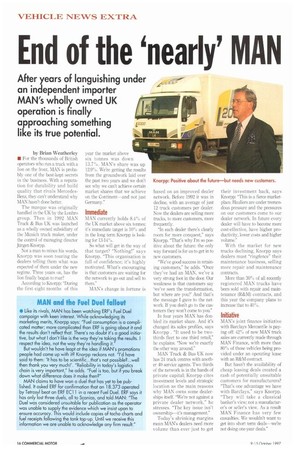End of the 'nearly' MAN
Page 18

If you've noticed an error in this article please click here to report it so we can fix it.
After years of languishing under an independent importer MAN's wholly owned UK operation is finally approaching something like its true potential.
by Brian Weatherley • For the thousands of British operators who run a truck with a lion on the front, MAN is probably one of the best-kept secrets in the business. With a reputation for durability and build quality that rivals MercedesBenz, they can't understand why MAN hasn't done better.
The marque was originally handled in the UK by the Lonhro group. Then in 1992 MAN Truck & Bus UK was launched as a wholly owned subsidiary of the Munich truck maker, under the control of managing director Jurgen Knorpp.
Not a man to mince his words, Knorpp was soon touring the dealers telling them what was expected of them under the new regime. Three years on, has the lion finally begun to roar?
According to Knorpp: "During the first eight months of this year the market above six tonnes was down 13.7%. MAN's share was up 12.9%. We're getting the results from the groundwork laid over the past two years and we don't see why we can't achieve certain market shares that we achieve on the Continent—and not just Germany."
Immediate
MAN currently holds 8.4% of the UK market above six tonnes; it's immediate target is 100 and in the long term Knorpp is looking for 13-14".i.
So what will get in the way of that target? "Nothing!" says Knorpp. "This organisation is full of confidence; it's highly motivated. What's encouraging is that customers are waiting for the network to go out and sell to them."
MAN's change in fortune is based on an improved dealer network. Before 1992 it was in decline, with an average of just 12 truck customers per dealer. Now the dealers are selling more trucks, to more customers, more frequently.
"In each dealer there's clearly room for more conquest," says Knorpp. "That's why I'm so positive about the future: the only way forward is for us to get in to new customers.
"We've good success in retaining customers," he adds. "Once they've had an MAN, we've a very strong foot in the door. Our weakness is that customers say 'we've seen the transformation, but where are you?' And that's the message I gave to the network. If you don't go to the customers they won't come to you."
In four years MAN has doubled its market share. And it's changed its sales profiles, says Knorpp . "It used to be twothirds fleet to one third retail," he explains. "Now we're exactly the other way around."
MAN Truck & Bus UK now has 24 truck centres with another 40 service agents. Two thirds of the network is in the hands of private capital; Knorpp cites investment levels and strategic location as the main reasons why MAN owns some dealerships itself. "We're not against a private dealer network." he stresses. "The key issue isn't ownership—it's management."
Today's shrinking margins mean MAN's dealers need more volume than ever just to get their investment back, says Knorpp: "This is a fierce marketplace. Hauliers are under tremendous pressure and the pressures on our customers come to our dealer network. In future every dealer will have to become more cost-effective, have higher productivity, lower costs and higher volume."
With the market for new trucks declining, Knorpp says dealers must "ringfence" their maintenance business, selling more repair and maintenance contracts.
More than 30% of all recently registered MAN trucks have been sold with repair and maintenance (R&M) contracts, and this year the company plans to increase that to 40%.
Initiative
MAN's joint finance initiative with Barclays Mercantile is paying off: 42% of new MAN truck sales are currently made through MAN Finance, with more than 80% of those vehicles being provided under an operating lease with an R&M contract.
But hasn't the availability of cheap leasing deals created a rash of potentially unsuitable customers for manufacturers? "That's one advantage we have with Barclays," says Knorpp. "They will take a classical banker's view; not a manufacturer's or seller's view. As a result MAN Finance has very few casualties. We wouldn't want to get into short term deals—we're not doing one-year deals."








































































































